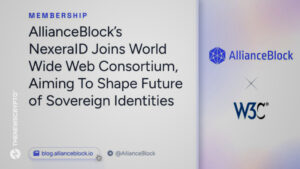NexeraID, the revolutionary self-sovereign identity issuance and verification solution from AllianceBlock, has joined the World Wide Web Consortium (W3C), the leading global Web standards body.
By employing self-custodial or custodial wallets, NexeraID’s self-sovereign identity issuance and verification technology enables businesses to onboard customers to Web3 in an effortless manner. It simplifies difficult compliance operations while preserving user privacy and assets. In order to do this, the system already conforms to the W3C’s existing standards for verifiable credentials (VCs) and decentralized identifiers (DIDs).
W3C is a worldwide technical organization that allows businesses, initiatives, and the general public to collaborate and create cutting-edge web technologies. The W3C, which is led by Tim Berners-Lee, the inventor of the World Wide Web, is best known for pioneering technical Web technologies like HTML and CSS. Its members actively contribute to creating a framework for technical ethics, developing core web technologies, and sharing ideas with thought leaders in the business and scientific communities.
“We are extremely excited to be working with fellow W3C member organizations in the development of interoperable web standards, bringing expertise to help shape the principles of sovereign identity, which can only be done by collaborating with other industry leaders in these fields,” says AllianceBlock Founder and CEO Rachid Ajaja.
450 world-class companies, including Microsoft, Apple, the Ethereum Foundation, and Coinbase, are members of the remarkable W3C. To encourage and promote the standardization of Decentralized Identifiers (DID) and Verifiable Credentials (VC) on the Web, NexeraID will proactively work with industry leaders. While working together to enhance and create new standards for the digital identity space, NexeraID will collaborate with W3C and gain access to a vast network of top industry players.
Last year, Decentralized Identifiers became an official Web standard. By enabling individuals and organizations to create and maintain their digital identities across technological borders, they are intended to provide consumers and organizations with more security and privacy. Another W3C standard called Verifiable Credentials enables users to provide digitally encrypted and secure proof during authentication procedures.
Built on top of the open-source AllianceBlock Nexera Protocol, the NexeraID technology uses a programmable smart wallet to securely store digital assets and identification information. NexeraID will be advantageous to both businesses and consumers. With NexeraID solutions, enterprise companies may quickly embrace Web3 and grow within it. Businesses may integrate the Web3 smart wallet and self-sovereign identities (SSI) into their infrastructures to enroll users and verify their compliance with legal requirements. The simple integration of NexeraID into corporate infrastructure encourages Web3 adoption and increases user conversion. Similar to existing Web2 practices, customers may establish safe and secure smart wallet accounts with NexeraID using their email or social network credentials. Biometrics, Apple ID, and Google Accounts may all be used to manage wallets. With spending limits and recovery guidelines, customers may further safeguard their smart wallets.


